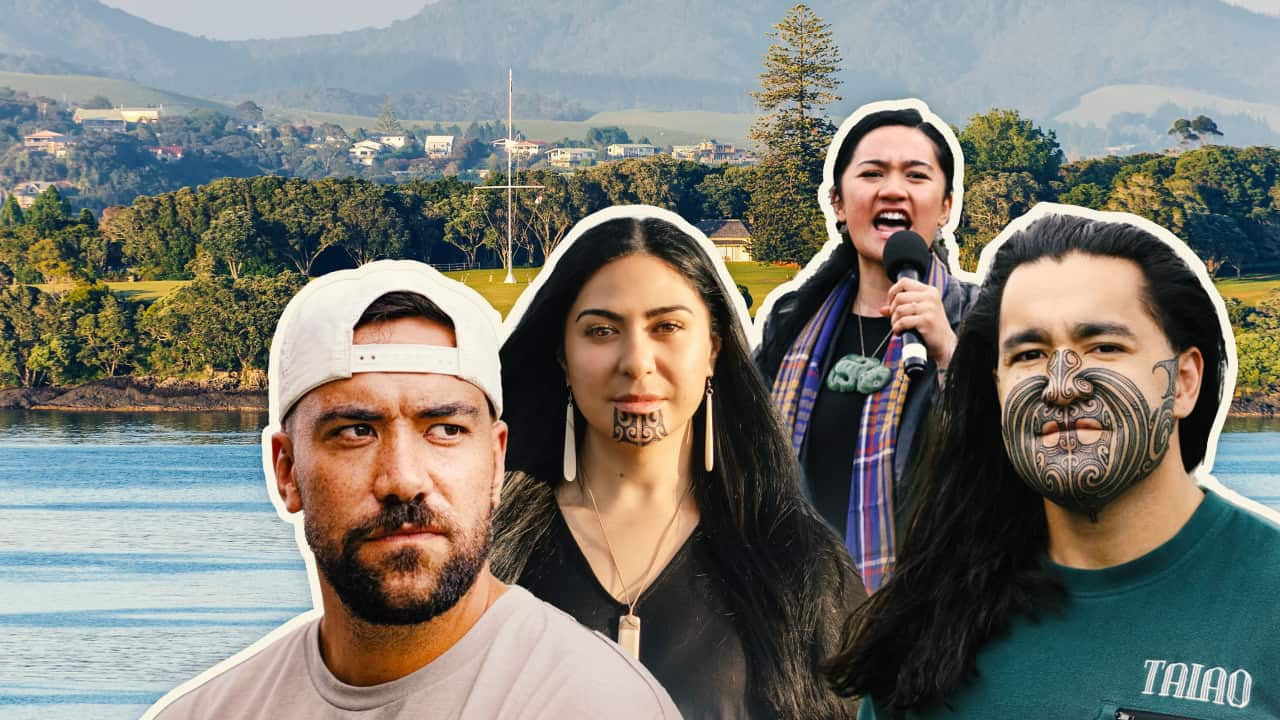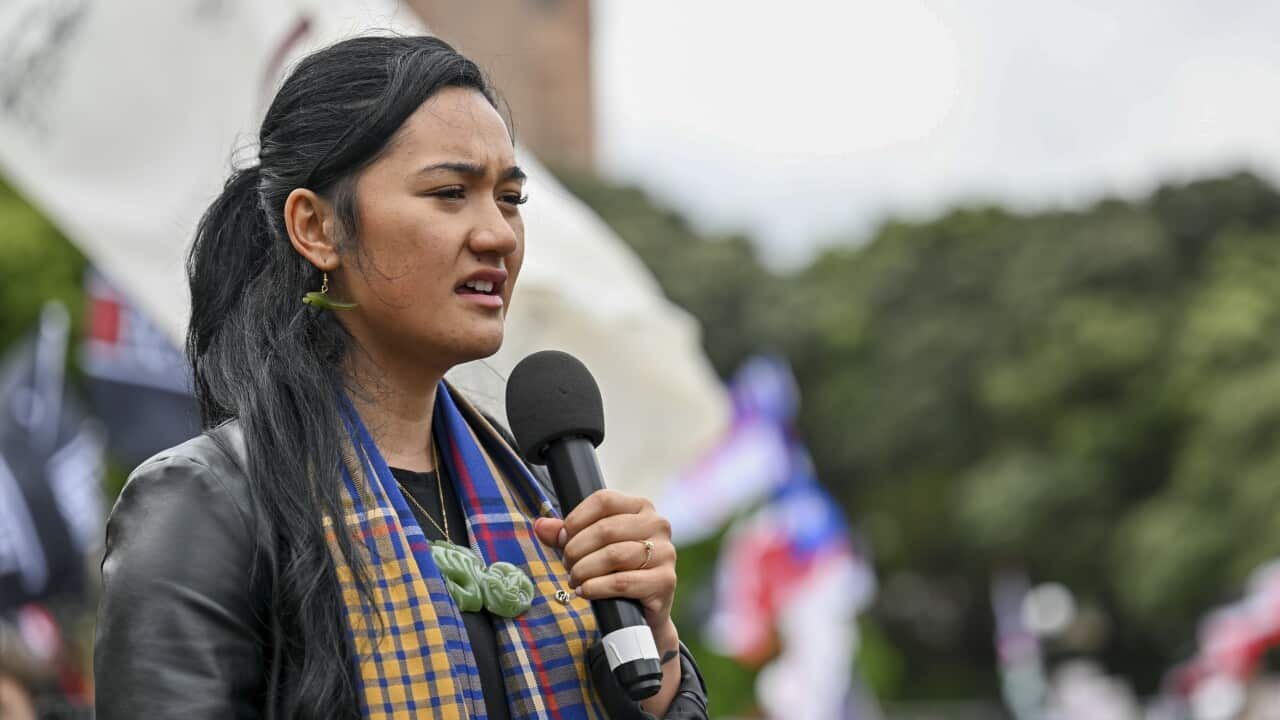Documentary maker Whatanui Flavell says this week is a "powerful time" in New Zealand, as young people who grew up in the latter years of the 'Māori renaissance' are finding their voice against .
The 32-year-old was born in Rotorua, which he says is known for its "stinky geysers and sweaty Māori warriors running around doing hakas".
Rotorua, a cultural hub for New Zealand's Indigenous Māori people, shaped Flavell's journey as a proud Māori activist. Exposed to both culture and politics from a young age, he began participating in demonstrations at just 10 years old.
Like hundreds of thousands of other Māori, Flavell has found himself increasingly called to action in recent years as the government seeks to challenge the Treaty of Waitangi, threatening 184 years of Indigenous self-determination.

Whatanui Flavell is a Māori documentary maker who focuses on culture and politics in his work. Source: Supplied
"There are many attempts to revitalise language and culture, and I see my job [as a documentarian] and television and storytelling as a part of the big picture of language and culture renaissance and revitalisation."
Around 500 kilometres north of Rotorua, on the tip of New Zealand's North Island, is the small town of Waitangi, where tens of thousands of Māori and other New Zealanders will gather for Waitangi Day on 6 February.

Whatanui Flavell says now is a "powerful time" for a generation of young Māori who are "really standing up". Source: Supplied
This year, more people than ever are expected to gather in Waitangi, eclipsing last year's 80,000, as people oppose a government bill to re-define the Treaty of Waitangi and how it is interpreted by law.
Why is the Treaty of Waitangi under threat?
was introduced by David Seymour, leader of the right-wing Association of Consumers and Taxpayers Party, which is part of a three-party coalition currently in government.
Prime Minister and leader of the National Party, Christopher Luxon, has said he won't support the bill, which means it can't pass.
Many believe the National Party should never have allied with Seymour or allowed him to introduce the bill.
The opposition has been so strong that, in January, Radio New Zealand reported a record 300,000 public submissions against it — more than double the previous record — and the parliamentary website even crashed.

Protesters calling on the New Zealand government to "honour the Treaty" at the Waitangi Treaty Grounds in Waitangi in 2024. Source: AAP / Ben McKay
[My grandparents] got the Māori smacked out of them — literally if they spoke their language, they were smacked at school.Whatanui Flavell, documentary maker
It's an example of the kind of cultural suppression that had become commonplace across New Zealand by the mid-20th century which gave rise to the so-called 'Māori renaissance' in the 1970s.
Lasting until the early 2000s, the renaissance was marked by a groundswell of youth-led action to revitalise Māori language and culture.
A hīkoi — meaning peaceful march — in 1975 resulted in the creation of the Waitangi Tribunal, a permanent commission of inquiry that oversees legal cases regarding the interpretation of the Treaty.
At the time, te reo Māori was in sharp decline. However, since it became an official language under the 1987 Māori Language Act, the number of speakers has steadily increased, largely due to education initiatives. Despite this progress, some educators are concerned that the numbers are still insufficient.
As of 2023, Māori people account for 17 per cent of the New Zealand population — 23 per cent spoke the language in 2021, according to Stats NZ.
Among te reo speakers, 22 per cent said they could speak the language "not very well" and only 8 per cent said they could speak it "at least fairly well".

Around 15,000 people joined a hīkoi in 2004 in Wellington to protest a government decision threatening Māori sovereignty over seabeds and foreshores. Credit: AAP
A history of peaceful hīkois
Flavell's father, Te Uroroa Flavell, was one of the organisers of the prominent 'Foreshore and Seabed' hīkoi in May 2004.
As many as 50,000 people marched against a government bill that sought to overrule a High Court decision that allowed some Māori people to claim ownership of the seabed and foreshore as part of existing titles.
The contentious Foreshore and Seabed Act was passed later that year but was repealed in 2011 following sustained pressure.
From there, Flavell senior joined the fledgling Māori Party and was elected as an MP in 2005, serving for 12 years, later becoming the party's co-leader. The party now has six MPs, and its leader, Debbie Ngarewa-Packer, says they represent "the only true opposition" in New Zealand.
Flavell says the community's desire and strength to "really stand up" has always been there, though it's been somewhat dormant since 2004.
"The issue I think for me is that us being more united has to come at a cost, and that cost at the moment is the Treaty, and in 2004, it was the foreshore and seabed," Flavell says.
"There are many other instances where something has to be taken in order for us to come together."
What's at risk now?
Seymour defended his Treaty Principles Bill in parliament in November, arguing it is essential to ensure equal rights for all citizens in modern-day New Zealand.
The same week, Hana-Rāwhiti Maipi-Clarke went viral around the world for ripping up Seymour's bill in its first reading and encouraging her colleagues to join her in a haka.

(Left to right) Debbie Ngarewa-Packer, Hana-Rāwhiti Maipi-Clarke and Eru Kapa-Kingi led a haka at the hīkoi as Māori communities marched to protect and advocate for the interpretation of the Treaty of Waitangi and Māori rights in 2024. Source: Getty / Joe Allison
The march was organised by Eru Kapa-Kingi, a Māori organiser and academic, who says its primary purpose was to celebrate and empower Māori.
"We organised it, but the momentum behind it was just waiting for something to tap into it, really," he said.
"That momentum has been built up over a number of years and really was a convergence of Māori who were ready for and believe in a future of Māori independence and are sick of a reality where we are continually and consistently treated as second-class citizens on our own land by successive governments."

Eru Kapa-Kingi is a Māori organiser who says the government is "one of the worst we've seen" with respect to upholding the Treaty of Waitangi. Source: Supplied
He says that growing up, it wasn't "cool or easy to be Māori", but there's been a shift in the last decade thanks to a "new generation of thinking" that doesn't "bow to a system that wasn't made for us".
"It's no coincidence. It's I think a direct result of us, the reclamation generation really coming into its own," Kapa-Kingi says.
It's becoming more normalised and also more accepted amongst ourselves to be Māori, to embrace our culture and to embrace our power as tangata whenua [original inhabitants].Eru Kapa-Kingi, a Māori organiser and academic
Kapa-Kingi says last year's Waitangi gatherings were "humongous" and this year will be even bigger.

Eru Kapa-Kingi says Waitangi Day is a time to reflect. Source: Getty / Joe Allison
"If we're reflecting on whether Treaty justice is a reality today, that reflection wouldn't take too long; the answer is pretty clearly, no," he says.
"That's why it's important to have forward-looking, onward-moving discussions at Waitangi around how we make that a reality."
'Hard conversations'
Te Aomihia Walker is a Māori youth activist who started an Indigenous environmental consulting business after experiencing the "devastating" effect of Cyclone Gabrielle on her hometown of Gisborne in 2023.
She says she hopes Waitangi Day will "further inspire conversations that integrate Indigenous perspectives into our national policy, like our ancestors had envisioned".
"These are hard conversations to have with a government that doesn't want to have them," she says.

Te Aomihia Walker is a Gisborne-based activist and environmental consultant. Source: Supplied
"To not have that compulsory throughout schools has made a major impact in terms of our Treaty education and a lot of New Zealanders don't know what it is," she says.
She says people need to understand that the Treaty didn't give Māori people rights, adding that "those rights were pre-existing before the British got here".
"We have those rights based on our genealogy to the land and the waterways and the Treaty just confirmed those rights, if anything," Walker says.
The government has identified 28 pieces of legislation, many of them environment-related, containing references or clauses relating to the Treaty that it wants to remove.
Walker says this is "really worrying", but she can see that "with chaos and crisis comes opportunity".
If anything, it's enabled us to come together a bit more as Māori as well as with our other Indigenous brothers and sisters from the Pacific and across the world as well as allies.Te Aomihia Walker, Māori youth activist
"Everyone's kind of seeing that we are just going backwards and it's just removing 40 years of hard work of people trying to integrate more Treaty rights policy into legislation."




